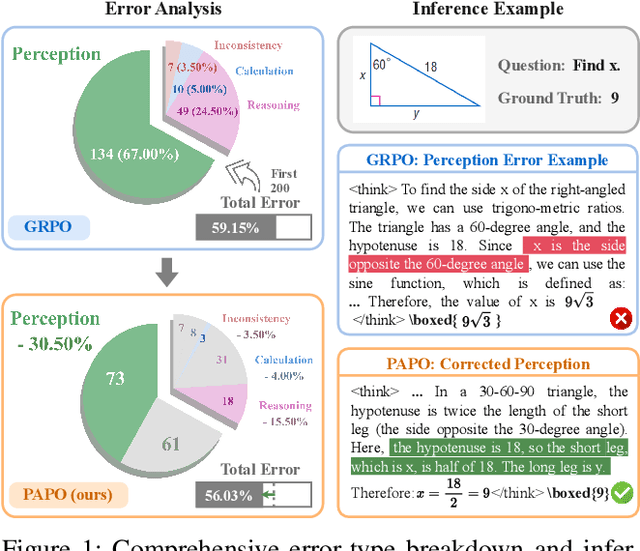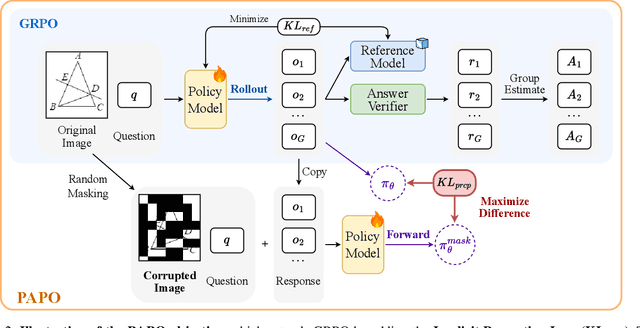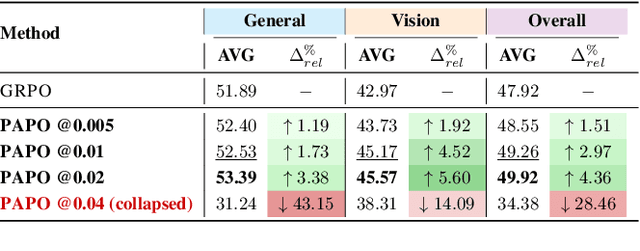Hongru Wang
Search-R2: Enhancing Search-Integrated Reasoning via Actor-Refiner Collaboration
Feb 03, 2026Abstract:Search-integrated reasoning enables language agents to transcend static parametric knowledge by actively querying external sources. However, training these agents via reinforcement learning is hindered by the multi-scale credit assignment problem: existing methods typically rely on sparse, trajectory-level rewards that fail to distinguish between high-quality reasoning and fortuitous guesses, leading to redundant or misleading search behaviors. To address this, we propose Search-R2, a novel Actor-Refiner collaboration framework that enhances reasoning through targeted intervention, with both components jointly optimized during training. Our approach decomposes the generation process into an Actor, which produces initial reasoning trajectories, and a Meta-Refiner, which selectively diagnoses and repairs flawed steps via a 'cut-and-regenerate' mechanism. To provide fine-grained supervision, we introduce a hybrid reward design that couples outcome correctness with a dense process reward quantifying the information density of retrieved evidence. Theoretically, we formalize the Actor-Refiner interaction as a smoothed mixture policy, proving that selective correction yields strict performance gains over strong baselines. Extensive experiments across various general and multi-hop QA datasets demonstrate that Search-R2 consistently outperforms strong RAG and RL-based baselines across model scales, achieving superior reasoning accuracy with minimal overhead.
Rethinking the Role of Entropy in Optimizing Tool-Use Behaviors for Large Language Model Agents
Feb 02, 2026Abstract:Tool-using agents based on Large Language Models (LLMs) excel in tasks such as mathematical reasoning and multi-hop question answering. However, in long trajectories, agents often trigger excessive and low-quality tool calls, increasing latency and degrading inference performance, making managing tool-use behavior challenging. In this work, we conduct entropy-based pilot experiments and observe a strong positive correlation between entropy reduction and high-quality tool calls. Building on this finding, we propose using entropy reduction as a supervisory signal and design two reward strategies to address the differing needs of optimizing tool-use behavior. Sparse outcome rewards provide coarse, trajectory-level guidance to improve efficiency, while dense process rewards offer fine-grained supervision to enhance performance. Experiments across diverse domains show that both reward designs improve tool-use behavior: the former reduces tool calls by 72.07% compared to the average of baselines, while the latter improves performance by 22.27%. These results position entropy reduction as a key mechanism for enhancing tool-use behavior, enabling agents to be more adaptive in real-world applications.
Why Reasoning Fails to Plan: A Planning-Centric Analysis of Long-Horizon Decision Making in LLM Agents
Jan 29, 2026Abstract:Large language model (LLM)-based agents exhibit strong step-by-step reasoning capabilities over short horizons, yet often fail to sustain coherent behavior over long planning horizons. We argue that this failure reflects a fundamental mismatch: step-wise reasoning induces a form of step-wise greedy policy that is adequate for short horizons but fails in long-horizon planning, where early actions must account for delayed consequences. From this planning-centric perspective, we study LLM-based agents in deterministic, fully structured environments with explicit state transitions and evaluation signals. Our analysis reveals a core failure mode of reasoning-based policies: locally optimal choices induced by step-wise scoring lead to early myopic commitments that are systematically amplified over time and difficult to recover from. We introduce FLARE (Future-aware Lookahead with Reward Estimation) as a minimal instantiation of future-aware planning to enforce explicit lookahead, value propagation, and limited commitment in a single model, allowing downstream outcomes to influence early decisions. Across multiple benchmarks, agent frameworks, and LLM backbones, FLARE consistently improves task performance and planning-level behavior, frequently allowing LLaMA-8B with FLARE to outperform GPT-4o with standard step-by-step reasoning. These results establish a clear distinction between reasoning and planning.
Illusions of Confidence? Diagnosing LLM Truthfulness via Neighborhood Consistency
Jan 09, 2026Abstract:As Large Language Models (LLMs) are increasingly deployed in real-world settings, correctness alone is insufficient. Reliable deployment requires maintaining truthful beliefs under contextual perturbations. Existing evaluations largely rely on point-wise confidence like Self-Consistency, which can mask brittle belief. We show that even facts answered with perfect self-consistency can rapidly collapse under mild contextual interference. To address this gap, we propose Neighbor-Consistency Belief (NCB), a structural measure of belief robustness that evaluates response coherence across a conceptual neighborhood. To validate the efficiency of NCB, we introduce a new cognitive stress-testing protocol that probes outputs stability under contextual interference. Experiments across multiple LLMs show that the performance of high-NCB data is relatively more resistant to interference. Finally, we present Structure-Aware Training (SAT), which optimizes context-invariant belief structure and reduces long-tail knowledge brittleness by approximately 30%. Code will be available at https://github.com/zjunlp/belief.
From Word to World: Can Large Language Models be Implicit Text-based World Models?
Dec 21, 2025Abstract:Agentic reinforcement learning increasingly relies on experience-driven scaling, yet real-world environments remain non-adaptive, limited in coverage, and difficult to scale. World models offer a potential way to improve learning efficiency through simulated experience, but it remains unclear whether large language models can reliably serve this role and under what conditions they meaningfully benefit agents. We study these questions in text-based environments, which provide a controlled setting to reinterpret language modeling as next-state prediction under interaction. We introduce a three-level framework for evaluating LLM-based world models: (i) fidelity and consistency, (ii) scalability and robustness, and (iii) agent utility. Across five representative environments, we find that sufficiently trained world models maintain coherent latent state, scale predictably with data and model size, and improve agent performance via action verification, synthetic trajectory generation, and warm-starting reinforcement learning. Meanwhile, these gains depend critically on behavioral coverage and environment complexity, delineating clear boundry on when world modeling effectively supports agent learning.
Explore to Evolve: Scaling Evolved Aggregation Logic via Proactive Online Exploration for Deep Research Agents
Oct 16, 2025Abstract:Deep research web agents not only retrieve information from diverse sources such as web environments, files, and multimodal inputs, but more importantly, they need to rigorously analyze and aggregate knowledge for insightful research. However, existing open-source deep research agents predominantly focus on enhancing information-seeking capabilities of web agents to locate specific information, while overlooking the essential need for information aggregation, which would limit their ability to support in-depth research. We propose an Explore to Evolve paradigm to scalably construct verifiable training data for web agents. Begins with proactive online exploration, an agent sources grounded information by exploring the real web. Using the collected evidence, the agent then self-evolves an aggregation program by selecting, composing, and refining operations from 12 high-level logical types to synthesize a verifiable QA pair. This evolution from high-level guidance to concrete operations allowed us to scalably produce WebAggregatorQA, a dataset of 10K samples across 50K websites and 11 domains. Based on an open-source agent framework, SmolAgents, we collect supervised fine-tuning trajectories to develop a series of foundation models, WebAggregator. WebAggregator-8B matches the performance of GPT-4.1, while the 32B variant surpasses GPT-4.1 by more than 10% on GAIA-text and closely approaches Claude-3.7-sonnet. Moreover, given the limited availability of benchmarks that evaluate web agents' information aggregation abilities, we construct a human-annotated evaluation split of WebAggregatorQA as a challenging test set. On this benchmark, Claude-3.7-sonnet only achieves 28%, and GPT-4.1 scores 25.8%. Even when agents manage to retrieve all references, they still struggle on WebAggregatorQA, highlighting the need to strengthen the information aggregation capabilities of web agent foundations.
A Survey of Self-Evolving Agents: On Path to Artificial Super Intelligence
Jul 28, 2025



Abstract:Large Language Models (LLMs) have demonstrated strong capabilities but remain fundamentally static, unable to adapt their internal parameters to novel tasks, evolving knowledge domains, or dynamic interaction contexts. As LLMs are increasingly deployed in open-ended, interactive environments, this static nature has become a critical bottleneck, necessitating agents that can adaptively reason, act, and evolve in real time. This paradigm shift -- from scaling static models to developing self-evolving agents -- has sparked growing interest in architectures and methods enabling continual learning and adaptation from data, interactions, and experiences. This survey provides the first systematic and comprehensive review of self-evolving agents, organized around three foundational dimensions -- what to evolve, when to evolve, and how to evolve. We examine evolutionary mechanisms across agent components (e.g., models, memory, tools, architecture), categorize adaptation methods by stages (e.g., intra-test-time, inter-test-time), and analyze the algorithmic and architectural designs that guide evolutionary adaptation (e.g., scalar rewards, textual feedback, single-agent and multi-agent systems). Additionally, we analyze evaluation metrics and benchmarks tailored for self-evolving agents, highlight applications in domains such as coding, education, and healthcare, and identify critical challenges and research directions in safety, scalability, and co-evolutionary dynamics. By providing a structured framework for understanding and designing self-evolving agents, this survey establishes a roadmap for advancing adaptive agentic systems in both research and real-world deployments, ultimately shedding lights to pave the way for the realization of Artificial Super Intelligence (ASI), where agents evolve autonomously, performing at or beyond human-level intelligence across a wide array of tasks.
Perception-Aware Policy Optimization for Multimodal Reasoning
Jul 08, 2025



Abstract:Reinforcement Learning with Verifiable Rewards (RLVR) has proven to be a highly effective strategy for endowing Large Language Models (LLMs) with robust multi-step reasoning abilities. However, its design and optimizations remain tailored to purely textual domains, resulting in suboptimal performance when applied to multimodal reasoning tasks. In particular, we observe that a major source of error in current multimodal reasoning lies in the perception of visual inputs. To address this bottleneck, we propose Perception-Aware Policy Optimization (PAPO), a simple yet effective extension of GRPO that encourages the model to learn to perceive while learning to reason, entirely from internal supervision signals. Notably, PAPO does not rely on additional data curation, external reward models, or proprietary models. Specifically, we introduce the Implicit Perception Loss in the form of a KL divergence term to the GRPO objective, which, despite its simplicity, yields significant overall improvements (4.4%) on diverse multimodal benchmarks. The improvements are more pronounced, approaching 8.0%, on tasks with high vision dependency. We also observe a substantial reduction (30.5%) in perception errors, indicating improved perceptual capabilities with PAPO. We conduct comprehensive analysis of PAPO and identify a unique loss hacking issue, which we rigorously analyze and mitigate through a Double Entropy Loss. Overall, our work introduces a deeper integration of perception-aware supervision into RLVR learning objectives and lays the groundwork for a new RL framework that encourages visually grounded reasoning. Project page: https://mikewangwzhl.github.io/PAPO.
AgentDistill: Training-Free Agent Distillation with Generalizable MCP Boxes
Jun 17, 2025



Abstract:While knowledge distillation has become a mature field for compressing large language models (LLMs) into smaller ones by aligning their outputs or internal representations, the distillation of LLM-based agents, which involve planning, memory, and tool use, remains relatively underexplored. Existing agent distillation methods typically replay full teacher trajectories or imitate step-by-step teacher tool usage, but they often struggle to train student agents to dynamically plan and act in novel environments. We propose AgentDistill, a novel, training-free agent distillation framework that enables efficient and scalable knowledge transfer via direct reuse of Model-Context-Protocols (MCPs), which are structured and reusable task-solving modules autonomously generated by teacher agents. The reuse of these distilled MCPs enables student agents to generalize their capabilities across domains and solve new problems with minimal supervision or human intervention. Experiments on biomedical and mathematical benchmarks demonstrate that our distilled student agents, built on small language models, can achieve performance comparable to advanced systems using large LLMs such as OctoTools (GPT-4o), highlighting the effectiveness of our framework in building scalable and cost-efficient intelligent agents.
DecisionFlow: Advancing Large Language Model as Principled Decision Maker
May 27, 2025Abstract:In high-stakes domains such as healthcare and finance, effective decision-making demands not just accurate outcomes but transparent and explainable reasoning. However, current language models often lack the structured deliberation needed for such tasks, instead generating decisions and justifications in a disconnected, post-hoc manner. To address this, we propose DecisionFlow, a novel decision modeling framework that guides models to reason over structured representations of actions, attributes, and constraints. Rather than predicting answers directly from prompts, DecisionFlow builds a semantically grounded decision space and infers a latent utility function to evaluate trade-offs in a transparent, utility-driven manner. This process produces decisions tightly coupled with interpretable rationales reflecting the model's reasoning. Empirical results on two high-stakes benchmarks show that DecisionFlow not only achieves up to 30% accuracy gains over strong prompting baselines but also enhances alignment in outcomes. Our work is a critical step toward integrating symbolic reasoning with LLMs, enabling more accountable, explainable, and reliable LLM decision support systems. We release the data and code at https://github.com/xiusic/DecisionFlow.
 Add to Chrome
Add to Chrome Add to Firefox
Add to Firefox Add to Edge
Add to Edge